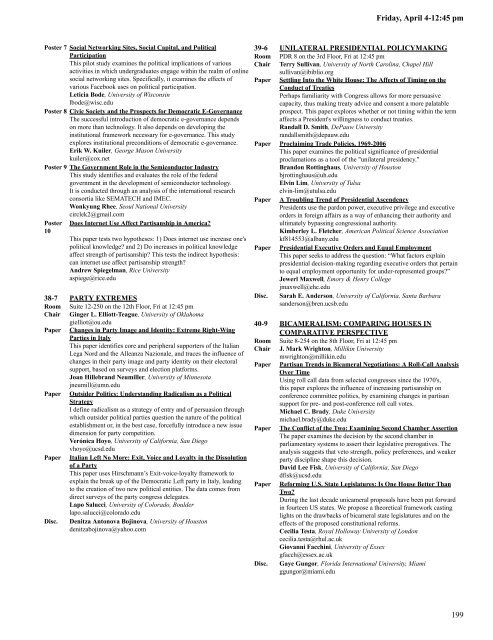2008 Conference Program - Midwest Political Science Association
2008 Conference Program - Midwest Political Science Association
2008 Conference Program - Midwest Political Science Association
Create successful ePaper yourself
Turn your PDF publications into a flip-book with our unique Google optimized e-Paper software.
Friday, April 4-12:45 pm<br />
Poster 7 Social Networking Sites, Social Capital, and <strong>Political</strong><br />
Participation<br />
This pilot study examines the political implications of various<br />
activities in which undergraduates engage within the realm of online<br />
social networking sites. Specifically, it examines the effects of<br />
various Facebook uses on political participation.<br />
Leticia Bode, University of Wisconsin<br />
lbode@wisc.edu<br />
Poster 8 Civic Society and the Prospects for Democratic E-Governance<br />
The successful introduction of democratic e-governance depends<br />
on more than technology. It also depends on developing the<br />
institutional framework necessary for e-governance. This study<br />
explores institutional preconditions of democratic e-governance.<br />
Erik W. Kuiler, George Mason University<br />
kuiler@cox.net<br />
Poster 9 The Government Role in the Semiconductor Industry<br />
This study identifies and evaluates the role of the federal<br />
government in the development of semiconductor technology.<br />
It is conducted through an analysis of the international research<br />
consortia like SEMATECH and IMEC.<br />
Wonkyung Rhee, Seoul National University<br />
circlek2@gmail.com<br />
Poster<br />
10<br />
Does Internet Use Affect Partisanship in America<br />
This paper tests two hypotheses: 1) Does internet use increase one's<br />
political knowledge and 2) Do increases in political knowledge<br />
affect strength of partisanship This tests the indirect hypothesis:<br />
can internet use affect partisanship strength<br />
Andrew Spiegelman, Rice University<br />
aspiege@rice.edu<br />
38-7 PARTY EXTREMES<br />
Room Suite 12-250 on the 12th Floor, Fri at 12:45 pm<br />
Chair Ginger L. Elliott-Teague, University of Oklahoma<br />
gielliot@ou.edu<br />
Paper Changes in Party Image and Identity: Extreme Right-Wing<br />
Parties in Italy<br />
This paper identifies core and peripheral supporters of the Italian<br />
Lega Nord and the Alleanza Nazionale, and traces the influence of<br />
changes in their party image and party identity on their electoral<br />
support, based on surveys and election platforms.<br />
Joan Hillebrand Neumiller, University of Minnesota<br />
jneumill@umn.edu<br />
Paper Outsider Politics: Understanding Radicalism as a <strong>Political</strong><br />
Strategy<br />
I define radicalism as a strategy of entry and of persuasion through<br />
which outsider political parties question the nature of the political<br />
establishment or, in the best case, forcefully introduce a new issue<br />
dimension for party competition.<br />
Verónica Hoyo, University of California, San Diego<br />
vhoyo@ucsd.edu<br />
Paper Italian Left No More: Exit, Voice and Loyalty in the Dissolution<br />
of a Party<br />
This paper uses Hirschmann’s Exit-voice-loyalty framework to<br />
explain the break up of the Democratic Left party in Italy, leading<br />
to the creation of two new political entities. The data comes from<br />
direct surveys of the party congress delegates.<br />
Lapo Salucci, University of Colorado, Boulder<br />
lapo.salucci@colorado.edu<br />
Disc. Denitza Antonova Bojinova, University of Houston<br />
denitzabojinova@yahoo.com<br />
39-6 UNILATERAL PRESIDENTIAL POLICYMAKING<br />
Room PDR 8 on the 3rd Floor, Fri at 12:45 pm<br />
Chair Terry Sullivan, University of North Carolina, Chapel Hill<br />
sullivan@ibiblio.org<br />
Paper Settling Into the White House: The Affects of Timing on the<br />
Conduct of Treaties<br />
Perhaps familiarity with Congress allows for more persuasive<br />
capacity, thus making treaty advice and consent a more palatable<br />
prospect. This paper explores whether or not timing within the term<br />
affects a President's willingness to conduct treaties.<br />
Randall D. Smith, DePauw University<br />
randallsmith@depauw.edu<br />
Paper Proclaiming Trade Policies, 1969-2006<br />
This paper examines the political significance of presidential<br />
proclamations as a tool of the "unilateral presidency."<br />
Brandon Rottinghaus, University of Houston<br />
bjrottinghaus@uh.edu<br />
Elvin Lim, University of Tulsa<br />
elvin-lim@utulsa.edu<br />
Paper A Troubling Trend of Presidential Ascendency<br />
Presidents use the pardon power, executive privilege and executive<br />
orders in foreign affairs as a way of enhancing their authority and<br />
ultimately bypassing congressional authority.<br />
Kimberley L. Fletcher, American <strong>Political</strong> <strong>Science</strong> <strong>Association</strong><br />
kf814553@albany.edu<br />
Paper Presidential Executive Orders and Equal Employment<br />
This paper seeks to address the question: “What factors explain<br />
presidential decision-making regarding executive orders that pertain<br />
to equal employment opportunity for under-represented groups”<br />
Jewerl Maxwell, Emory & Henry College<br />
jmaxwell@ehc.edu<br />
Disc. Sarah E. Anderson, University of California, Santa Barbara<br />
sanderson@bren.ucsb.edu<br />
40-9 BICAMERALISM: COMPARING HOUSES IN<br />
COMPARATIVE PERSPECTIVE<br />
Room Suite 8-254 on the 8th Floor, Fri at 12:45 pm<br />
Chair J. Mark Wrighton, Millikin University<br />
mwrighton@millikin.edu<br />
Paper Partisan Trends in Bicameral Negotiations: A Roll-Call Analysis<br />
Over Time<br />
Using roll call data from selected congresses since the 1970's,<br />
this paper explores the influence of increasing partisanship on<br />
conference committee politics, by examining changes in partisan<br />
support for pre- and post-conference roll call votes.<br />
Michael C. Brady, Duke University<br />
michael.brady@duke.edu<br />
Paper The Conflict of the Two: Examining Second Chamber Assertion<br />
The paper examines the decision by the second chamber in<br />
parliamentary systems to assert their legislative prerogatives. The<br />
analysis suggests that veto strength, policy preferences, and weaker<br />
party discipline shape this decision.<br />
David Lee Fisk, University of California, San Diego<br />
dfisk@ucsd.edu<br />
Paper Reforming U.S. State Legislatures: Is One House Better Than<br />
Two<br />
During the last decade unicameral proposals have been put forward<br />
in fourteen US states. We propose a theoretical framework casting<br />
lights on the drawbacks of bicameral state legislatures and on the<br />
effects of the proposed constitutional reforms.<br />
Cecilia Testa, Royal Holloway University of London<br />
cecilia.testa@rhul.ac.uk<br />
Giovanni Facchini, University of Essex<br />
gfacch@essex.ac.uk<br />
Disc. Gaye Gungor, Florida International University, Miami<br />
ggungor@miami.edu<br />
199










